PPC Specialist Interview Question Bank
If you’re preparing for a role in paid advertising, this PPC Specialist Interview Question Bank is your ultimate companion. Whether you’re a beginner or seasoned professional, knowing what to expect can give you a real edge.
We’ve compiled essential questions across all areas, from your technical skills and past experience to how you think on your feet and solve problems. With these questions in hand, you’ll feel confident walking into any interview room. Let’s make sure you’re ready to impress every step of the way.
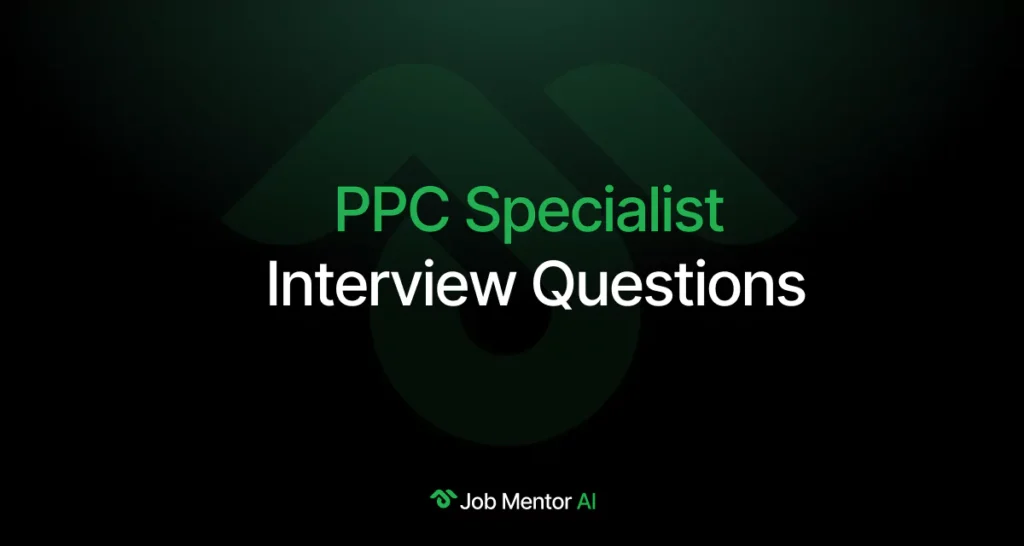
Introductory Phase (About You)
1. Can you tell us about yourself?
2. Why did you choose a career in PPC advertising?
3. What excites you most about this role?
4. What are your strengths as a marketer?
5. What do you enjoy doing outside of work or studies?
Background and Experience
1. Have you worked on any PPC campaigns? Can you describe one?
2. What tools have you used for PPC advertising?
3. Have you ever managed a budget for a campaign?
4. What is the most successful campaign you’ve worked on, and why?
5. How do you stay updated with trends in PPC and digital marketing?
Technical/Tools Expertise PPC Specialist Interview Question Bank
1. What do you know about Google Ads?
2. Can you explain the concept of Quality Score in Google Ads?
3. What is the difference between CPC, CPM, and CPA?
4. How do you conduct keyword research?
5. What is ad targeting, and what options are available?
Behavioral and Situational PPC Specialist Interview Question Bank
1. How do you handle tight deadlines for PPC campaigns?
2. What would you do if a campaign wasn’t meeting its goals?
3. Describe a time when you worked with a team to deliver a project.
4. How do you handle feedback or criticism on your campaigns?
5. What would you do if a client wanted immediate results from a PPC campaign?
Critical Thinking PPC Specialist Interview Question Bank
1. How would you optimize a campaign with a limited budget?
2. What steps would you take to improve a low CTR on an ad?
3. How do you decide which keywords to target?
4. What would you do if a competitor outranked your ads consistently?
5. How would you approach creating a PPC strategy for a new product?
Performance-Based Questions PPC Specialist Interview Question Bank
1. Can you create a basic PPC campaign structure?
2. How would you write an engaging ad copy for a product?
3. What steps would you take to set up conversion tracking for a campaign?
4. How would you conduct an A/B test on ad creatives?
Problem-Solving and Analytical Thinking PPC Specialist Interview Question Bank
1. What would you do if your campaign’s cost-per-click was too high?
2. How would you reduce wasted spend in a PPC campaign?
3. What steps would you take to improve a slow-loading interface?
4. How do you handle fluctuating performance metrics during a campaign?
5. What would you do if your client’s campaign wasn’t aligned with their goals?
Career Growth PPC Specialist Interview Question Bank
1. What do you hope to achieve in this role?
2. Where do you see yourself in 3-5 years?
3. What kind of campaigns inspire you?
4. Are you interested in learning more about other areas of digital marketing?
5. What motivates you to grow as a designer?
Introductory Phase (About You)
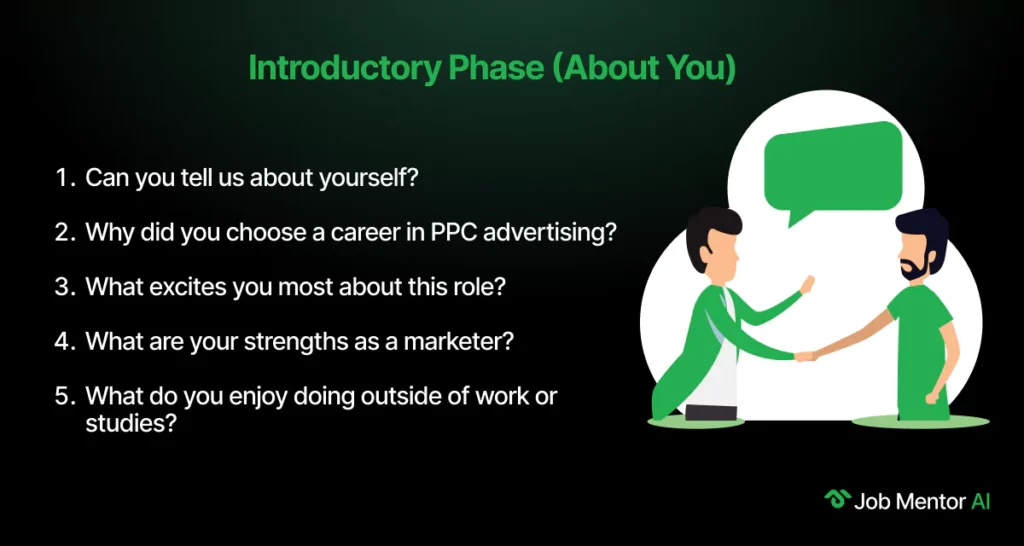
1. Can you tell us about yourself?
What Interviewers Want:
A concise overview of your background, interest in PPC advertising, and any relevant experience or skills.
Strong Answer:
“I have a degree in Marketing and recently completed a certification in Google Ads. During my studies, I gained hands-on experience managing mock campaigns and analyzing performance metrics. I enjoy combining creativity and data analysis to create impactful advertising strategies, and I’m excited to apply these skills in a professional setting.”
Poor Answer:
“I studied marketing and completed a certification in Google Ads. I’m interested in working in PPC to gain experience.”
2. Why did you choose a career in PPC advertising?
What Interviewers Want:
A clear explanation of your passion for digital marketing, analytics, and driving measurable results.
Strong Answer:
“I enjoy the challenge of creating data-driven strategies to reach the right audience and achieve measurable results. PPC advertising allows me to combine creativity in crafting ads with analytical skills to optimize performance. I find it rewarding to see the immediate impact of well-executed campaigns.”
Poor Answer:
“I chose PPC because it’s interesting to work with ads and analyze campaign performance.”
3. What excites you most about this role?
What Interviewers Want:
Enthusiasm for the opportunity to work on campaigns, learn from the team, or contribute to the company’s growth.
Strong Answer:
“I’m excited about the opportunity to manage campaigns that drive real business results. I admire your company’s focus on innovative digital strategies, and I’m eager to learn from your experienced team while contributing to campaign success and growth.”
Poor Answer:
“I’m excited to work on PPC campaigns and learn more about digital marketing in this role.”
4. What are your strengths as a marketer?
What Interviewers Want:
Confidence in skills like creativity, analytical thinking, or attention to detail.
Strong Answer:
“My strengths include strong analytical skills, attention to detail, and creativity. I excel at interpreting performance data to identify trends and opportunities for optimization. Additionally, I’m skilled at crafting engaging ad copy that resonates with target audiences, which helps improve click-through and conversion rates.”
Poor Answer:
“My strengths are being analytical, detail-oriented, and creative, which are important in marketing.”
5. What do you enjoy doing outside of work or studies?
What Interviewers Want:
Insight into hobbies or activities that demonstrate curiosity, creativity, or analytical thinking.
Strong Answer:
“I enjoy exploring trends in digital marketing and staying updated with tools like Google Ads and Facebook Ads Manager. Outside of that, I like solving puzzles and playing strategy games, which helps sharpen my analytical thinking. I’m also a big fan of photography, which fuels my creativity.”
Poor Answer:
“I like keeping up with marketing trends and enjoy activities like solving puzzles or photography.”
Background and Experience
In PPC interviews, your past speaks volumes. This PPC Specialist Interview Question Bank includes questions that focus on your previous job roles, campaign budgets, industries you’ve worked in, and the types of ads you’ve run.
Employers want to see how your past performance can translate into future results. Be ready to talk about how you’ve improved campaign efficiency or reduced costs. Your ability to reflect on your journey and connect it to their business goals will make a strong impression.
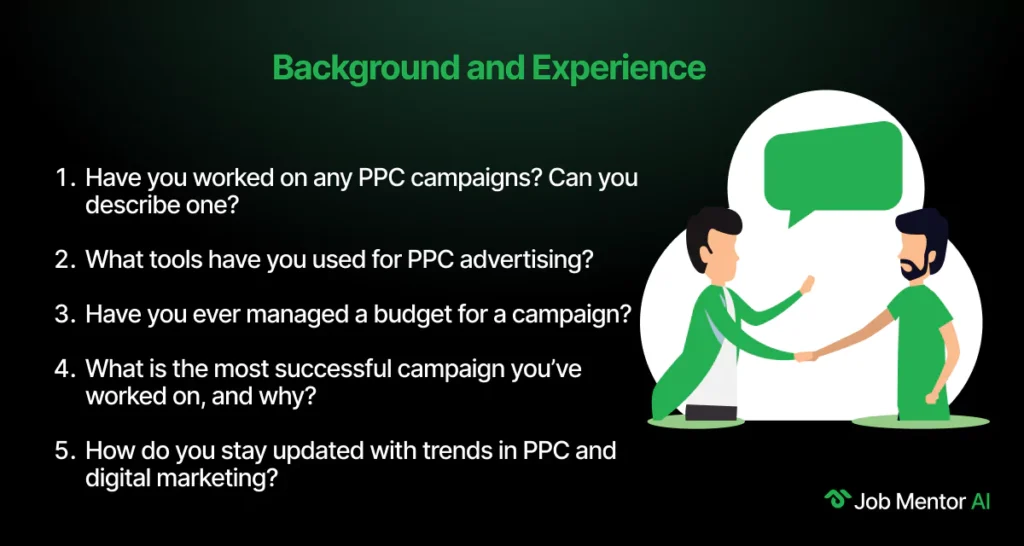
1. Have you worked on any PPC campaigns? Can you describe one?
What Interviewers Want:
Examples of projects that showcase your experience with platforms like Google Ads or Meta Ads Manager.
Strong Answer:
“During my digital marketing course, I managed a mock Google Ads campaign for an e-commerce store. I set up a search campaign targeting high-intent keywords and optimized ad copy based on competitor analysis. Over the two-week campaign, I monitored performance and adjusted bids, achieving a 5% increase in simulated CTR and a reduction in cost per click.”
Poor Answer:
“I worked on a Google Ads campaign for an e-commerce site and adjusted bids to improve performance.”
2. What tools have you used for PPC advertising?
What Interviewers Want:
Familiarity with platforms like Google Ads, Meta Ads Manager, Microsoft Ads, or any keyword research tools.
Strong Answer:
“I’ve worked with Google Ads for search and display campaigns, and Meta Ads Manager for social media advertising. For keyword research, I’ve used tools like Google Keyword Planner and Ubersuggest. I also used Google Analytics to track campaign performance and analyze user behavior.”
Poor Answer:
“I’ve used Google Ads, Meta Ads Manager, and tools like Google Keyword Planner.”
3. Have you ever managed a budget for a campaign?
What Interviewers Want:
Insight into your ability to handle budgets effectively, even if it’s on a small scale.
Strong Answer:
“Yes, I managed a $500 budget for a mock campaign during my certification program. I allocated the budget based on keyword competitiveness and ad group performance. I regularly monitored spending to ensure the campaign stayed within budget while maximizing clicks and conversions.”
Poor Answer:
“I managed a small budget for a mock campaign and made sure we didn’t overspend.”
4. What is the most successful campaign you’ve worked on, and why?
What Interviewers Want:
Examples of measurable results, such as improved click-through rates (CTR) or ROI.
Strong Answer:
“The most successful campaign I worked on was a simulated campaign for a local coffee shop. By focusing on long-tail keywords and crafting targeted ad copy, I increased the simulated CTR by 10%. I also adjusted bids based on location performance, which improved the conversion rate significantly. The success was due to continuous optimization and data-driven decisions.”
Poor Answer:
“I worked on a mock campaign that had a good CTR and performed well because I optimized the ads.”
5. How do you stay updated with trends in PPC and digital marketing?
What Interviewers Want:
Commitment to continuous learning through blogs, certifications, or industry updates.
Strong Answer:
“I follow blogs like Search Engine Journal and WordStream, and I regularly participate in webinars and online courses to enhance my knowledge. I’ve also subscribed to newsletters from Google and Meta to stay informed about updates to their advertising platforms.”
Poor Answer:
“I read blogs and take courses to stay updated on PPC and digital marketing trends.”
Explore these helpful interview question guides
Technical/Tools Expertise PPC Specialist Interview Question Bank
This section of the PPC Specialist Interview Question Bank targets your hands-on skills with tools like Google Ads, Meta Ads Manager, and keyword planning software. Employers want to know if you can navigate these platforms with ease and get results.
You might be asked about conversion tracking, smart bidding strategies, or how you handle ad quality scores. Be prepared to discuss your favorite tools and how you use them to optimize campaigns. Showing that you’re comfortable with the tech stack is a huge plus.
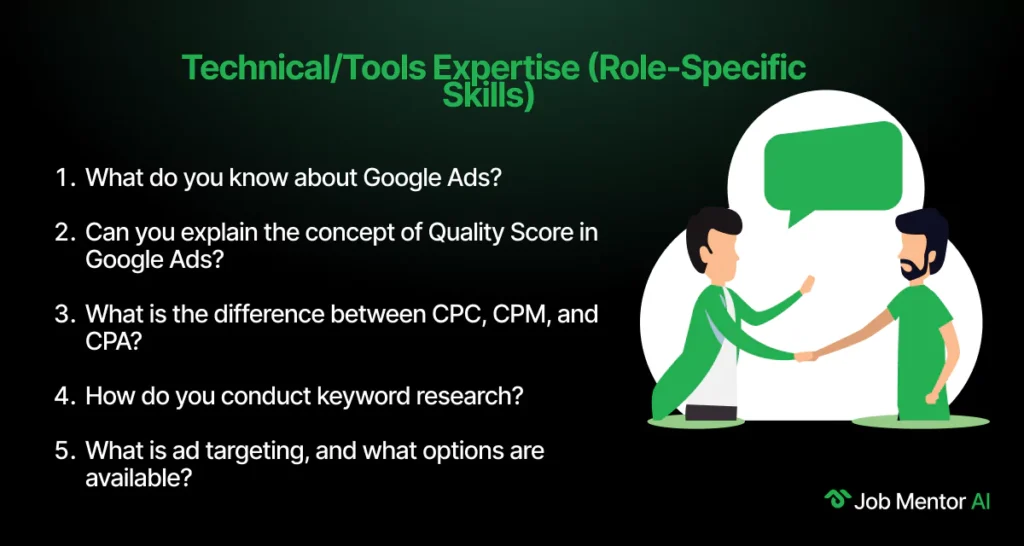
1. What do you know about Google Ads?
What Interviewers Want:
A basic understanding of how the platform works, including ad types and targeting options.
Strong Answer:
“Google Ads is a platform for creating and managing pay-per-click (PPC) campaigns. It allows advertisers to target specific audiences using various ad formats, including search, display, shopping, and video ads. With advanced targeting options like location, demographics, and interests, businesses can tailor ads to reach the right audience at the right time.”
Poor Answer:
“Google Ads is used to create ads that show up on Google search and other websites.”
2. Can you explain the concept of Quality Score in Google Ads?
What Interviewers Want:
Awareness of how Quality Score affects ad rank and cost-per-click (CPC).
Strong Answer:
“Quality Score is a metric Google uses to evaluate the relevance and quality of your ads, keywords, and landing pages. It affects your ad rank and cost-per-click (CPC). A higher Quality Score can lower costs and improve ad placement. It’s calculated based on expected CTR, ad relevance, and landing page experience.”
Poor Answer:
“Quality Score measures how good your ad is and affects your ad placement and cost.”
3. What is the difference between CPC, CPM, and CPA?
What Interviewers Want:
Understanding of different bidding models and when to use them.
Strong Answer:
“CPC (Cost-Per-Click) charges advertisers for each click on their ad, ideal for driving traffic. CPM (Cost-Per-Thousand Impressions) charges for every 1,000 views, suited for brand awareness. CPA (Cost-Per-Acquisition) charges when a specific action, like a sale or signup, occurs, focusing on conversions.”
Poor Answer:
“CPC is for clicks, CPM is for impressions, and CPA is for actions.”
4. How do you conduct keyword research?
What Interviewers Want:
Familiarity with tools like Google Keyword Planner, SEMrush, or Ubersuggest.
Strong Answer:
“I start by understanding the target audience and their intent. I use tools like Google Keyword Planner, SEMrush, and Ubersuggest to find relevant keywords with high search volume and low competition. I analyze competitor keywords and prioritize long-tail keywords for better targeting.”
Poor Answer:
“I use tools like Keyword Planner and SEMrush to find relevant keywords for campaigns.”
5. What is ad targeting, and what options are available?
What Interviewers Want:
Knowledge of targeting options like demographics, interests, location, and device types.
Strong Answer:
“Ad targeting is the process of defining specific audience segments to ensure ads reach the right people. Options include demographic targeting (age, gender, income), geographic targeting, device targeting, interests, and behavior-based targeting like remarketing.”
Poor Answer:
“Ad targeting helps ads reach specific people based on their location, demographics, or interests.”
6. What is remarketing, and why is it important?
What Interviewers Want:
Awareness of how remarketing helps re-engage potential customers.
Strong Answer:
“Remarketing targets users who have previously interacted with your website or app. It’s important because it helps re-engage potential customers, reminding them of your product or service and increasing the chances of conversion.”
Poor Answer:
“Remarketing shows ads to people who’ve visited your website to get them to come back.”
7. What is your process for creating an ad copy?
What Interviewers Want:
Understanding of how to write engaging, keyword-rich ad copy tailored to the audience.
Strong Answer:
“I focus on crafting engaging headlines and descriptions that include target keywords. The copy emphasizes benefits and includes a clear call-to-action. For example, in a campaign promoting a free trial, I’d use language like ‘Start your free trial today’ to drive action.”
Poor Answer:
“I write ad copy with clear headlines and calls-to-action that include keywords.”
8. How do you measure the success of a PPC campaign?
What Interviewers Want:
Familiarity with metrics like CTR, conversion rates, and ROI.
Strong Answer:
“I measure success using key metrics like CTR to evaluate ad performance, conversion rate to assess lead or sales generation, and ROI to determine overall profitability. I also analyze metrics like bounce rate and cost-per-conversion to identify areas for improvement.”
Poor Answer:
“I look at metrics like clicks, conversions, and ROI to see how the campaign performed.”
9. What is the difference between a search ad and a display ad?
What Interviewers Want:
Understanding of the purpose and use cases for each ad type.
Strong Answer:
“Search ads appear on search engine results pages and are keyword-driven, ideal for capturing high-intent users. Display ads, on the other hand, appear on websites within the Google Display Network and are more visual, focusing on building brand awareness.”
Poor Answer:
“Search ads show on Google search results, and display ads show on other websites.”
10. What is A/B testing in PPC?
What Interviewers Want:
Awareness of testing different ad variations to determine the most effective one.
Strong Answer:
“A/B testing involves creating two versions of an ad with slight differences, such as in the headline or call-to-action, to determine which performs better. It helps optimize campaigns by identifying what resonates most with the audience.”
Poor Answer:
“A/B testing is testing two different ads to see which one gets better results.”
11. What do you know about negative keywords?
What Interviewers Want:
Understanding of how negative keywords improve ad relevance and reduce wasted spend.
Strong Answer:
“Negative keywords are terms you exclude from your campaigns to prevent your ads from showing on irrelevant searches. This improves ad relevance, reduces wasted spend, and ensures better targeting.”
Poor Answer:
“Negative keywords stop your ads from showing for irrelevant searches.”
12. How do you optimize landing pages for PPC campaigns?
What Interviewers Want:
Awareness of alignment between ad copy and landing page content, design, and calls to action.
Strong Answer:
“I ensure the landing page aligns with the ad copy and includes a clear call-to-action. The design should be simple, mobile-friendly, and load quickly. I also use A/B testing to refine elements like headlines, images, or forms for better conversions.”
Poor Answer:
“I make the landing page match the ad copy and ensure it has a good call-to-action.”
13. What are some common reasons for a high bounce rate in PPC campaigns?
What Interviewers Want:
Understanding of potential issues like irrelevant ad targeting or poor landing page design.
Strong Answer:
“High bounce rates can result from irrelevant ad targeting, slow-loading landing pages, or a mismatch between the ad copy and the landing page content. Poor user experience, such as cluttered layouts or confusing navigation, can also contribute.”
Poor Answer:
“Bounce rates are high if the landing page is slow or doesn’t match the ad copy.”
14. How do you track conversions in PPC campaigns?
What Interviewers Want:
Familiarity with tools like Google Tag Manager or setting up conversion tracking in ad platforms.
Strong Answer:
“I use tools like Google Ads conversion tracking and Google Tag Manager to set up tracking pixels or event tags. These tools help monitor actions like purchases, signups, or downloads to measure campaign effectiveness.”
Poor Answer:
“I set up conversion tracking in Google Ads or Tag Manager to track user actions.”
15. What is your experience with analytics tools?
What Interviewers Want:
Familiarity with Google Analytics, Ads Manager reports, or other tools for analyzing campaign performance.
Strong Answer:
“I’ve worked with Google Analytics to analyze campaign performance, track user behavior, and measure conversion paths. I’ve also used platform-specific tools like Google Ads and Meta Ads Manager to monitor metrics and optimize campaigns.”
Poor Answer:
“I’ve used Google Analytics and Ads Manager to track campaign performance.”
Behavioral and Situational PPC Specialist Interview Question Bank
Behavioral questions help interviewers understand how you act under pressure, manage workloads, or deal with clients. This PPC Specialist Interview Question Bank provides scenarios where you’ll need to explain how you handled real-life challenges.
Maybe you had to recover a failing campaign, work with a difficult team, or meet a last-minute deadline. Sharing these stories honestly, while highlighting what you learned, shows that you’re adaptable and solution-focused, two key traits for any PPC role.
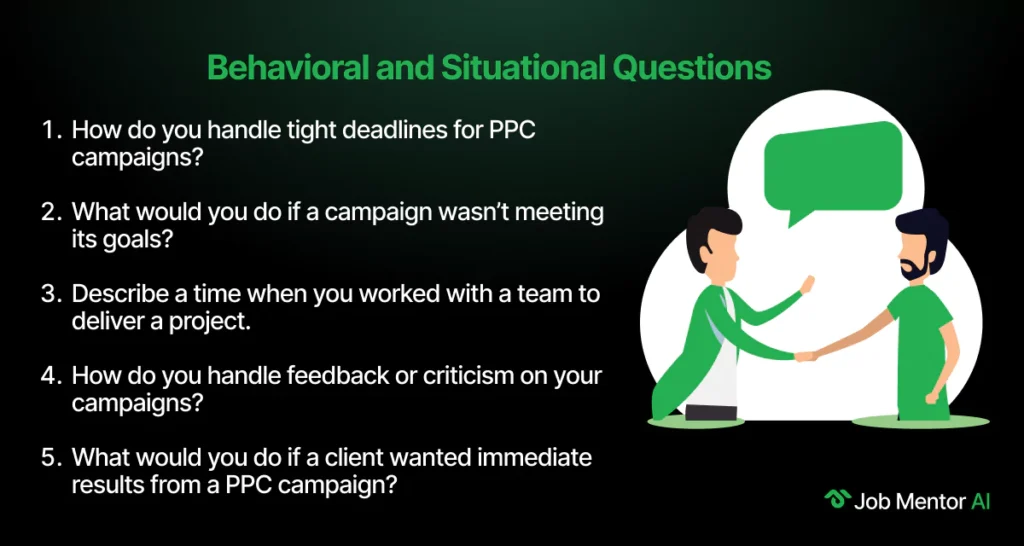
1. How do you handle tight deadlines for PPC campaigns?
What Interviewers Want:
Time management and prioritization skills.
Strong Answer:
“I prioritize tasks by focusing on critical elements like setting up targeting, ad copy, and budget allocation first. I use checklists to stay organized and ensure nothing is missed. If needed, I communicate with the team to delegate tasks and manage expectations, ensuring the campaign launches on time without compromising quality.”
Poor Answer:
“I work quickly and focus on important tasks to meet the deadline.”
2. What would you do if a campaign wasn’t meeting its goals?
What Interviewers Want:
Analytical thinking to identify issues and propose adjustments.
Strong Answer:
“I’d analyze performance metrics like CTR, conversion rate, and cost-per-click to identify the issue. For example, if the CTR is low, I’d test new ad copy or adjust targeting. If conversions are the problem, I’d review the landing page for alignment with the ad and user intent. Continuous optimization based on data helps improve results.”
Poor Answer:
“I’d check the metrics and make adjustments to improve performance.”
3. Describe a time when you worked with a team to deliver a project.
What Interviewers Want:
Collaboration skills and your ability to contribute to team success.
Strong Answer:
“During a group project for my digital marketing certification, I collaborated with team members to create a mock PPC campaign. I handled keyword research and ad copy, while others managed the landing page and performance analysis. We held regular meetings to ensure alignment and successfully delivered a campaign that met all project goals.”
Poor Answer:
“I worked with a team on a PPC project, where we divided tasks and delivered it on time.”
4. How do you handle feedback or criticism on your campaigns?
What Interviewers Want:
Openness to constructive criticism and a willingness to improve.
Strong Answer:
“I welcome feedback as an opportunity to improve. For example, when a manager suggested refining ad copy for better alignment with the landing page, I reviewed the suggestion, made adjustments, and saw an increase in CTR. I believe constructive criticism helps me grow as a PPC specialist.”
Poor Answer:
“I listen to feedback and make changes to improve the campaign.”
5. What would you do if a client wanted immediate results from a PPC campaign?
What Interviewers Want:
Ability to set realistic expectations and suggest quick-win strategies.
Strong Answer:
“I’d set realistic expectations by explaining that PPC campaigns take time to optimize for the best results. However, I’d propose quick-win strategies like focusing on high-intent keywords or running a remarketing campaign to target users already familiar with the brand. This helps achieve some initial results while working on long-term optimization.”
Poor Answer:
“I’d explain that results take time but focus on optimizing the campaign as quickly as possible.”
6. Have you ever had to learn a new PPC tool quickly? How did you manage it?
What Interviewers Want:
Adaptability and eagerness to learn.
Strong Answer:
“Yes, I needed to learn Meta Ads Manager for a project. I started by exploring its interface and watching tutorials, then practiced by setting up a mock campaign. I also referred to Meta’s help documentation and asked colleagues for tips. Within a week, I felt confident managing campaigns and analyzing their performance.”
Poor Answer:
“I learned Meta Ads Manager by watching tutorials and practicing with mock campaigns.”
7. What would you do if a client wanted to focus on a keyword with low search volume?
What Interviewers Want:
Ability to explain data-driven decisions and suggest alternatives.
Strong Answer:
“I’d explain the limitations of focusing on low-search-volume keywords and provide data to show why they might not deliver the desired results. I’d suggest alternative keywords with higher search volume and relevance to their goals. If the keyword is critical to their brand, I’d include it in a limited capacity alongside broader terms.”
Poor Answer:
“I’d explain that the keyword has low search volume and suggest using other keywords instead.”
Critical Thinking PPC Specialist Interview Question Bank
Smart thinking leads to smart spending. This PPC Specialist Interview Question Bank includes questions that challenge your ability to make thoughtful decisions with data and limited budgets. Employers may ask how you decide which campaigns to pause, how to reallocate ad spend, or what you do when performance drops.
These questions are designed to test how you think, not just what you know. Your ability to connect insights to action is what will really stand out.
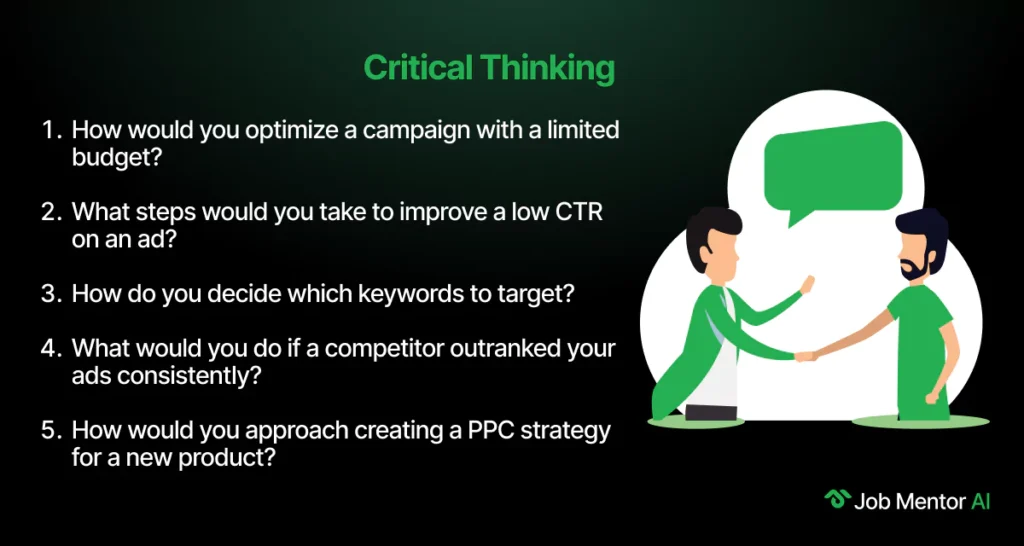
1. How would you optimize a campaign with a limited budget?
What Interviewers Want:
Creativity in prioritizing high-performing keywords and ad groups.
Strong Answer:
“I’d focus on high-performing keywords that deliver the best ROI and pause underperforming ones. I’d prioritize targeting high-intent audiences and refine ad copy to improve Quality Score, reducing CPC. Additionally, I’d use negative keywords to eliminate irrelevant clicks and allocate the budget to campaigns or ad groups with the best performance.”
Poor Answer:
“I’d focus on high-performing keywords and reduce spending on underperforming ones.”
2. What steps would you take to improve a low CTR on an ad?
What Interviewers Want:
Strategies like refining ad copy, adjusting targeting, or using extensions.
Strong Answer:
“I’d start by revisiting the ad copy to ensure it’s compelling, relevant, and includes strong calls-to-action. I’d also test different headlines and descriptions through A/B testing. If the issue persists, I’d refine audience targeting and use ad extensions like site links or callouts to increase visibility and engagement.”
Poor Answer:
“I’d adjust the ad copy and try testing different variations to improve the CTR.”
3. How do you decide which keywords to target?
What Interviewers Want:
A structured approach considering search volume, competition, and relevance.
Strong Answer:
“I prioritize keywords based on search volume, competition, and relevance to the product or service. Using tools like Google Keyword Planner, I identify high-value keywords with a balance of decent traffic and lower competition. I also include long-tail keywords to capture specific user intent and reduce costs.”
Poor Answer:
“I look for keywords with high search volume and relevance to the product or service.”
4. What would you do if a competitor outranked your ads consistently?
What Interviewers Want:
Strategies for improving Quality Score, bid adjustments, or targeting long-tail keywords.
Strong Answer:
“I’d analyze their ads and landing pages to identify what they’re doing well. Then, I’d focus on improving our Quality Score by refining ad copy, enhancing landing page relevance, and targeting long-tail keywords. I’d also test bid adjustments and explore additional audience segments to differentiate our strategy.”
Poor Answer:
“I’d analyze the competitor’s ads and improve our copy and bids to outrank them.”
5. How would you approach creating a PPC strategy for a new product?
What Interviewers Want:
A clear plan covering audience research, ad copy, keywords, and metrics.
Strong Answer:
“I’d start by researching the target audience to understand their needs and preferences. Then, I’d identify high-intent keywords related to the product and craft ad copy highlighting unique selling points. I’d allocate the budget across search and display campaigns, set clear goals like increasing traffic or conversions, and use A/B testing to refine the strategy as the campaign progresses.”
Poor Answer:
“I’d research the target audience, select relevant keywords, and create ads to promote the product.”
Performance-Based Questions PPC Specialist Interview Question Bank
Numbers matter in PPC and hiring managers want to see yours. In this part of the PPC Specialist Interview Question Bank, expect to share your results: CTR, CPC, ROAS, and all the metrics that define your success. You may be asked how you measure campaign performance or report results to clients.
Be ready to walk through a campaign you managed, the strategy behind it, and how your actions directly impacted business outcomes. It’s all about proving the value you bring.
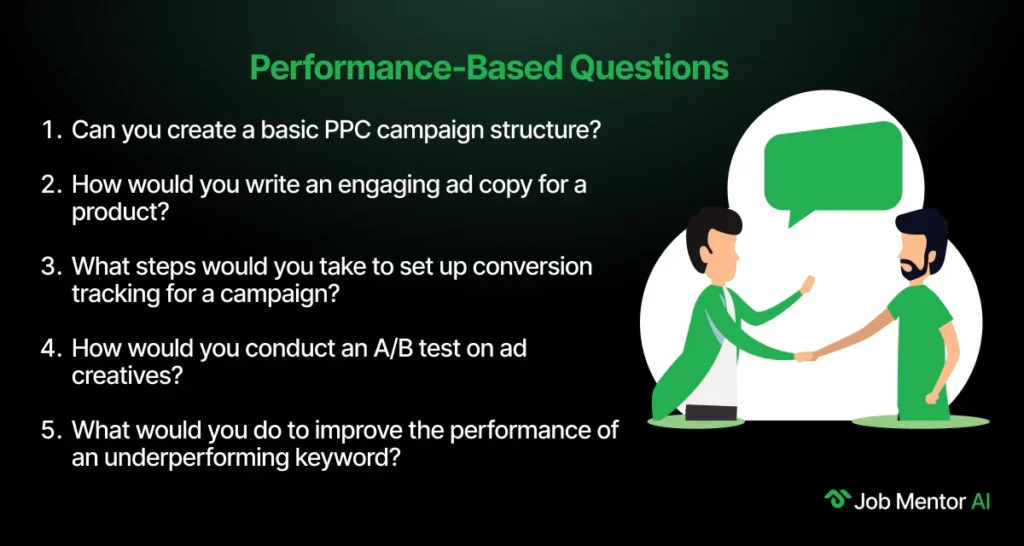
1. Can you create a basic PPC campaign structure?
What Interviewers Want:
Understanding of organizing campaigns into ad groups, keywords, and ads.
Strong Answer:
“I’d start by defining the campaign’s objective, such as increasing conversions or driving traffic. Then, I’d organize the campaign into ad groups based on themes or product categories. Each ad group would target a set of closely related keywords and have tailored ad copy. For example, in an e-commerce campaign, one ad group might focus on ‘Men’s Shoes’ with relevant keywords and ads, while another focuses on ‘Women’s Shoes.’ This structure ensures relevance and easier optimization.”
Poor Answer:
“I’d organize the campaign into ad groups and include relevant keywords and ads in each.”
2. How would you write an engaging ad copy for a product?
What Interviewers Want:
Creativity in crafting a concise, impactful message.
Strong Answer:
“I’d focus on highlighting the product’s unique benefits and use action-oriented language. For example, for a fitness app, I might write: ‘Get Fit Anywhere! Download Our App for Custom Workouts & Real-Time Coaching. Start Your Free Trial Today.’ I’d include a clear call-to-action to guide users toward the desired action.”
Poor Answer:
“I’d write an ad that highlights the product’s benefits and includes a call-to-action.”
3. What steps would you take to set up conversion tracking for a campaign?
What Interviewers Want:
Familiarity with setting up tracking using tools like Google Tag Manager.
Strong Answer:
“I’d start by defining what counts as a conversion, such as purchases or sign-ups. Then, I’d create a conversion action in Google Ads and generate the tracking tag. Using Google Tag Manager, I’d implement the tag on the website, ensuring it’s placed on the relevant pages like the confirmation or thank-you page. Finally, I’d test the setup to verify the tracking works correctly.”
Poor Answer:
“I’d set up a conversion action in Google Ads, add the tag to the website, and test it.”
4. How would you conduct an A/B test on ad creatives?
What Interviewers Want:
A practical understanding of testing and analyzing ad variations.
Strong Answer:
“I’d create two versions of the ad with a single variable, such as the headline or call-to-action. For example, one ad might say ‘Free Shipping on All Orders,’ while the other says ‘Order Now for Free Delivery.’ I’d run the ads simultaneously under the same conditions to gather data on their performance. After analyzing metrics like CTR and conversions, I’d implement the higher-performing version.”
Poor Answer:
“I’d create two ad variations with different elements and compare their performance.”
5. What would you do to improve the performance of an underperforming keyword?
What Interviewers Want:
Strategies like adjusting bids, refining match types, or improving ad relevance.
Strong Answer:
“I’d review the keyword’s match type to ensure it aligns with the campaign’s intent. If CTR is low, I’d refine the ad copy to make it more relevant. If CPC is too high, I’d adjust the bid or consider targeting a long-tail variation. I’d also analyze the landing page to ensure it aligns with the keyword and provides a seamless user experience.”
Poor Answer:
“I’d adjust the bid and improve the ad copy to make the keyword perform better.”
Problem-Solving and Analytical Thinking PPC Specialist Interview Question Bank
This section of the PPC Specialist Interview Question Bank explores how well you solve campaign challenges. You’ll face questions about how you troubleshoot a sudden drop in performance or what you do when ad costs spike.
Interviewers are looking for a calm, methodical approach and strong analytical thinking. It helps to talk about real examples where you spotted a problem, dug into the data, and made changes that turned things around.
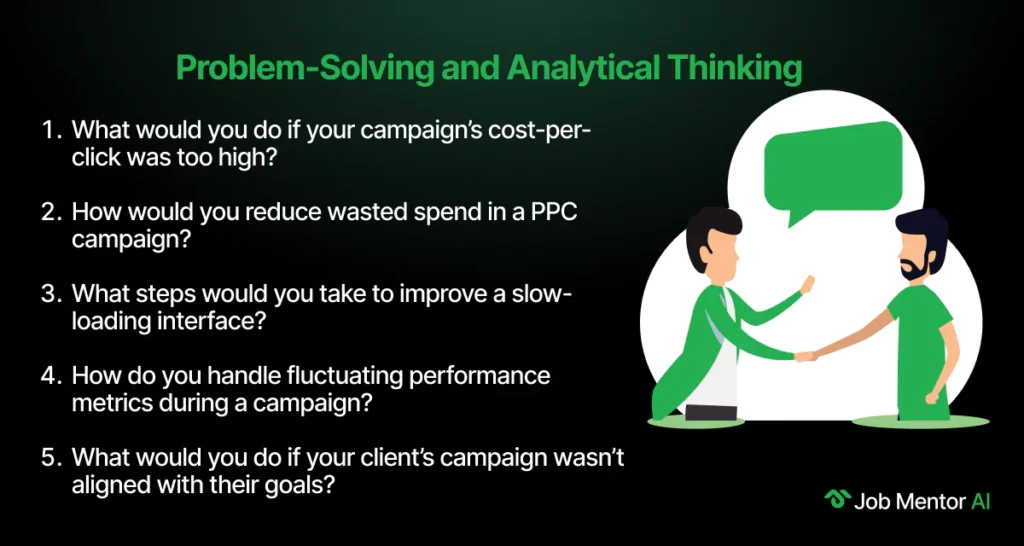
1. What would you do if your campaign’s cost-per-click was too high?
What Interviewers Want:
Strategies like adjusting targeting, improving Quality Score, or using negative keywords.
Strong Answer:
“I’d analyze the Quality Score for the keywords to ensure relevance in ad copy and landing pages. If needed, I’d refine targeting to focus on high-converting audiences and adjust bids for better control. I’d also use negative keywords to eliminate irrelevant clicks and explore long-tail keywords for lower competition.”
Poor Answer:
“I’d reduce the bids and focus on improving the Quality Score.”
2. How would you reduce wasted spend in a PPC campaign?
What Interviewers Want:
Awareness of optimizing keywords, using negative keywords, and refining targeting.
Strong Answer:
“I’d start by adding negative keywords to prevent ads from showing on irrelevant searches. Then, I’d analyze audience targeting and refine it to focus on users most likely to convert. I’d also monitor underperforming keywords or placements and reallocate the budget to high-performing areas.”
Poor Answer:
“I’d use negative keywords and focus the budget on better-performing keywords.”
3. What steps would you take to improve a slow-loading interface?
What Interviewers Want:
A focus on improving landing pages, ad copy, or audience targeting.
Strong Answer:
“I’d review the ad copy and landing page to ensure consistency and alignment with the user’s intent. If the page isn’t optimized, I’d improve its design, load speed, and call-to-action. Additionally, I’d refine targeting to focus on audiences more likely to convert and use A/B testing to identify the most effective variations.”
Poor Answer:
“I’d make changes to the landing page and improve targeting to increase conversions.”
4. How do you handle fluctuating performance metrics during a campaign?
What Interviewers Want:
Ability to monitor, analyze, and make data-driven adjustments.
Strong Answer:
“I monitor performance metrics regularly and analyze trends to identify potential causes, such as changes in competition or seasonality. I’d adjust bids, refine targeting, or test ad variations to stabilize performance. If fluctuations persist, I’d communicate findings to stakeholders and recommend a revised strategy.”
Poor Answer:
“I’d analyze the metrics and make adjustments to improve performance.”
5. What would you do if your client’s campaign wasn’t aligned with their goals?
What Interviewers Want:
Communication skills to realign the strategy with client objectives.
Strong Answer:
“I’d schedule a meeting to discuss their goals and gather feedback on what’s missing from the current strategy. I’d then use this input to revise the campaign, ensuring alignment with their objectives. For example, if they prioritize lead generation, I’d focus on high-intent keywords and create tailored ad copy to drive sign-ups or inquiries.”
Poor Answer:
“I’d discuss the client’s goals and adjust the campaign to match their expectations.”
6. How would you approach creating a remarketing campaign?
What Interviewers Want:
Understanding of segmenting audiences and creating tailored ads.
Strong Answer:
“I’d segment the audience based on their behavior, such as users who visited specific pages or abandoned their carts. Then, I’d create tailored ad copy addressing their needs and include a clear call-to-action. For example, I’d offer a discount to cart abandoners to encourage them to complete their purchase. I’d also set frequency caps to avoid overwhelming users.”
Poor Answer:
“I’d target users who visited the website and create ads to bring them back.”
7. What steps would you take to lower a campaign’s bounce rate?
What Interviewers Want:
Awareness of aligning ads with landing pages and improving page load times.
Strong Answer:
“I’d ensure the landing page aligns closely with the ad copy and user intent. If the page isn’t mobile-friendly or loads slowly, I’d optimize these aspects. I’d also use clear calls-to-action and simplify navigation to keep users engaged. Analyzing user behavior can help identify specific pain points to address.”
Poor Answer:
“I’d improve the landing page and make sure it matches the ad copy.”
8. How would you optimize a campaign for mobile users?
What Interviewers Want:
Knowledge of mobile-friendly ads, responsive landing pages, and targeting mobile devices.
Strong Answer:
“I’d use mobile-specific ad formats, such as call-only ads, and ensure landing pages are responsive and load quickly. I’d also adjust bids for mobile devices and include extensions like click-to-call to improve engagement. Testing the campaign on different devices ensures a seamless mobile experience.”
Poor Answer:
“I’d create mobile-friendly ads and ensure the landing page is responsive.”
9. What would you do if a client requested targeting a very broad audience?
What Interviewers Want:
Ability to refine targeting to balance reach and relevance.
Strong Answer:
“I’d explain the importance of balancing reach and relevance to maximize ROI. I’d recommend segmenting the audience into smaller, more targeted groups and creating tailored ads for each segment. If broad targeting is essential, I’d use detailed exclusions and negative keywords to refine the audience.”
Poor Answer:
“I’d try to target a broad audience while adding filters to make it more relevant.”
10. How do you handle seasonal fluctuations in campaign performance?
What Interviewers Want:
Awareness of adjusting budgets, bids, and targeting for seasonality.
Strong Answer:
“I’d analyze historical data to anticipate seasonal trends and adjust budgets and bids accordingly. For example, I’d increase spending during peak seasons and focus on high-performing keywords. In the off-season, I’d shift the strategy to brand awareness or audience building to maintain visibility.”
Poor Answer:
“I’d increase the budget during peak seasons and lower it during slower times.”
Career Growth PPC Specialist Interview Question Bank
Interviewers often want to know your long-term vision. This part of the PPC Specialist Interview Question Bank focuses on your career ambitions and how the role fits into your path. Are you looking to lead teams, specialize in a certain ad platform, or become a digital strategist? Sharing your learning goals and passion for staying updated with trends (like AI in advertising) can give you an edge.
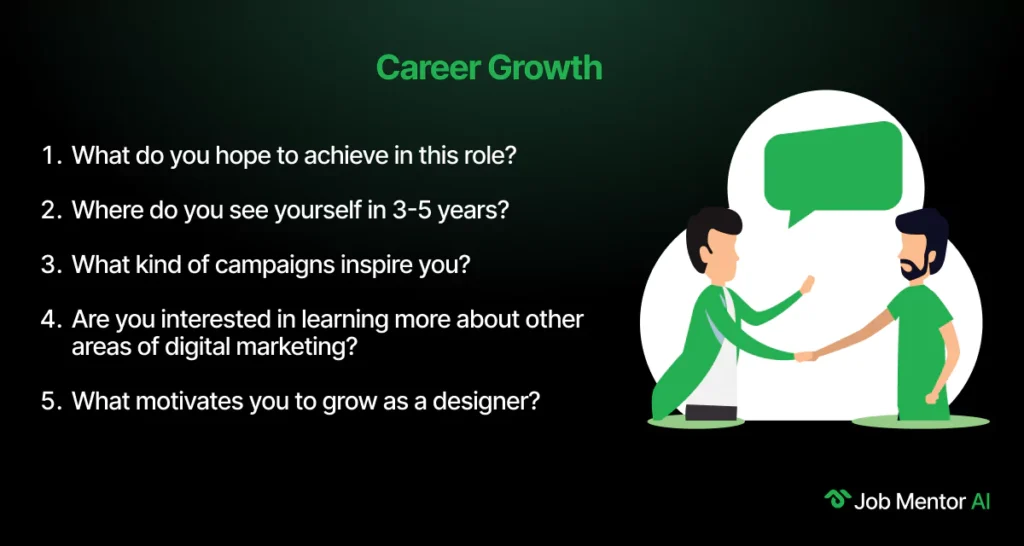
1. What do you hope to achieve in this role?
What Interviewers Want:
A clear desire to grow in PPC advertising and contribute to team success.
Strong Answer:
“I hope to deepen my expertise in PPC advertising by managing campaigns across different industries and learning from the experienced team here. I aim to improve my skills in strategy development, data analysis, and campaign optimization while contributing to the success of the company’s advertising efforts.”
Poor Answer:
“I want to learn more about PPC and work on campaigns to gain experience.”
2. Where do you see yourself in 3-5 years?
What Interviewers Want:
A vision of long-term growth in PPC or broader digital marketing roles.
Strong Answer:
“In 3-5 years, I see myself as a senior PPC specialist or digital marketing manager, leading campaigns and mentoring junior team members. I’d like to expand my expertise to include multi-channel marketing strategies and play a key role in driving measurable results for the business.”
Poor Answer:
“I want to be in a senior role where I can manage campaigns and help the team.”
3. What kind of campaigns inspire you?
What Interviewers Want:
Passion for creating impactful and innovative advertising campaigns.
Strong Answer:
“I’m inspired by campaigns that combine creativity with data-driven strategies to deliver exceptional results. For example, I admire how brands use storytelling in video ads or remarketing campaigns to engage users and boost conversions. Campaigns that focus on personalization and user experience are particularly exciting to me.”
Poor Answer:
“I enjoy creative campaigns that get results and engage users effectively.”
4. Are you interested in learning more about other areas of digital marketing?
What Interviewers Want:
Interest in expanding skills and cross-functional collaboration.
Strong Answer:
“Absolutely. I’m particularly interested in SEO and content marketing, as they complement PPC strategies by improving organic visibility and user engagement. Learning more about these areas would help me develop integrated campaigns and collaborate effectively with other teams.”
Poor Answer:
“Yes, I’d like to learn more about areas like SEO or social media to improve my skills.”
5. What motivates you to grow as a designer?
What Interviewers Want:
A passion for delivering results and mastering the craft of paid advertising.
Strong Answer:
“I’m motivated by the challenge of driving measurable results and continuously improving campaign performance. I enjoy analyzing data to uncover insights and testing new strategies to maximize ROI. Seeing the tangible impact of my work on a client’s success keeps me excited to grow in this field.”
Poor Answer:
“I’m motivated by the results I can achieve in campaigns and by learning new strategies.”
Ready for the Next Step in Your Career? Start with AI PPC Specialist Interview Question Bank
Ready to put your prep into action? Combine this PPC Specialist Interview Question Bank with tools like an AI Interview Assistant to simulate real interviews and receive instant feedback. Try AI Mock Interview Practice to rehearse your answers in realistic settings and improve under pressure. And if you need help shaping your answers, use our AI Interview Answer Generator to craft strong, personalized responses. These AI tools work alongside this guide to help you stand out from other candidates.
Questions to Ask Interviewer PPC Specialist Interview Question Bank
- What tools and platforms will I use in this role?
- What kind of campaigns will I work on?
- What opportunities are there for mentorship or growth?
- How does the PPC team collaborate with other teams here?
- What are the next steps in the hiring process?
PPC Specialist Interview Question Bank
Table of Contents
Recommended Resources
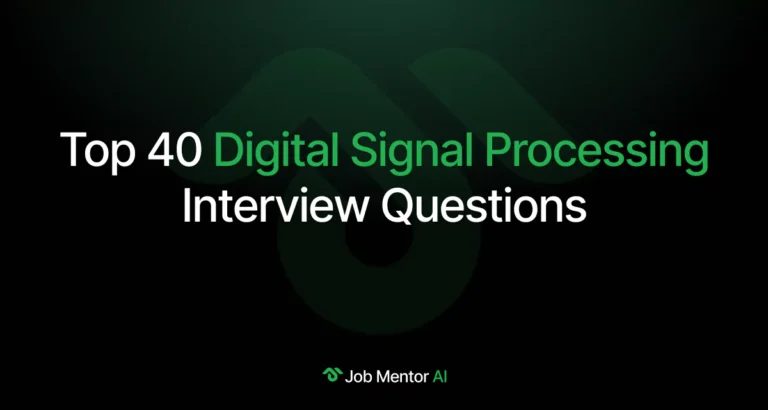
Top 40 Digital Signal Processing Interview Questions
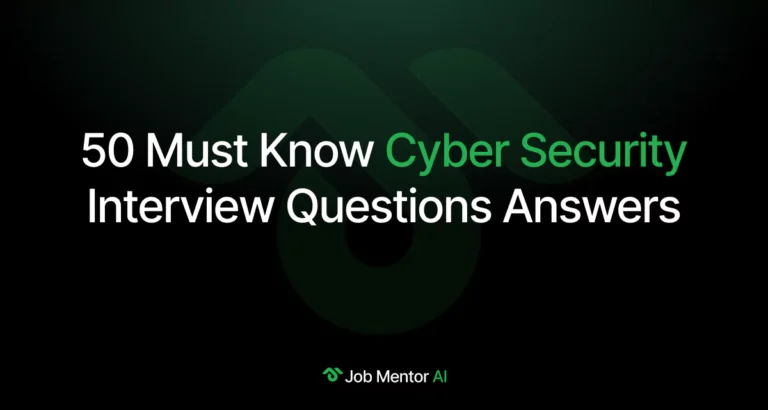
50 Must Know Cyber Security Interview Questions Answers
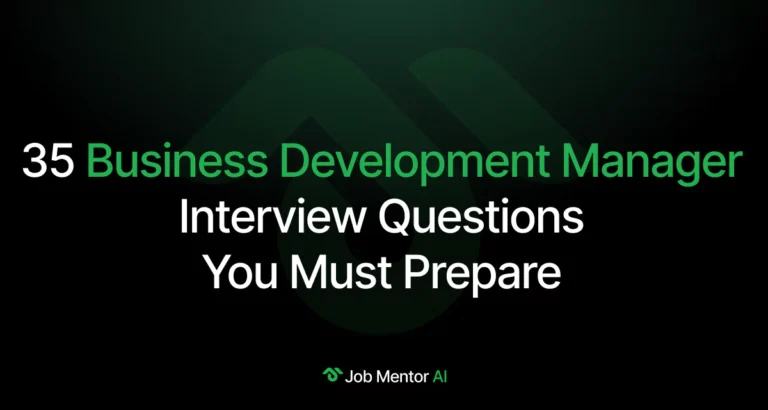
Business Development Manager
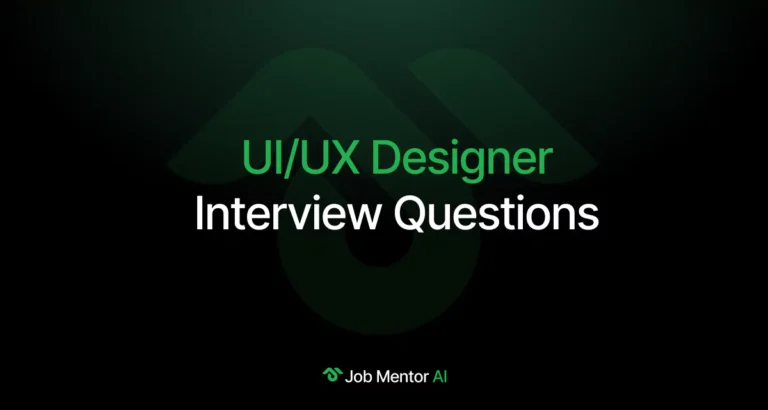
UI/UX Designer Interview Questions
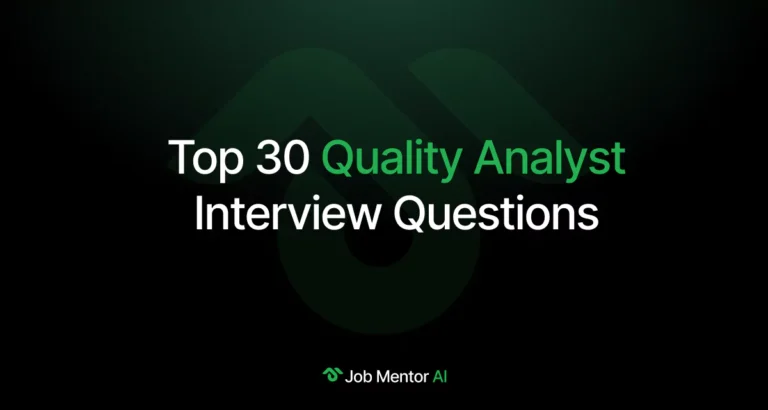
Top 30 Quality Analyst Interview Questions
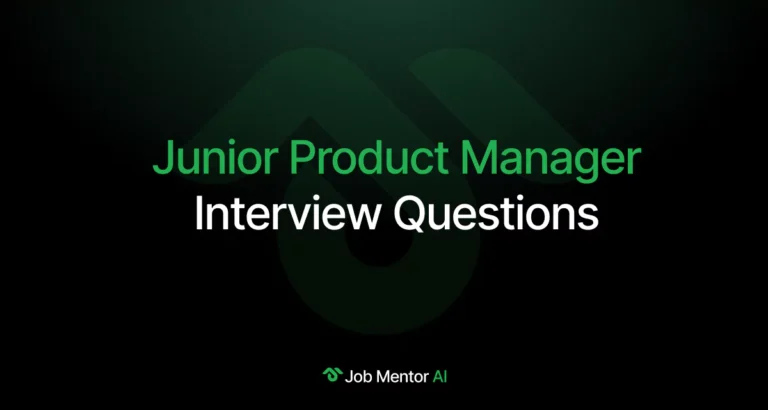
Junior Product Manager Interview Questions
